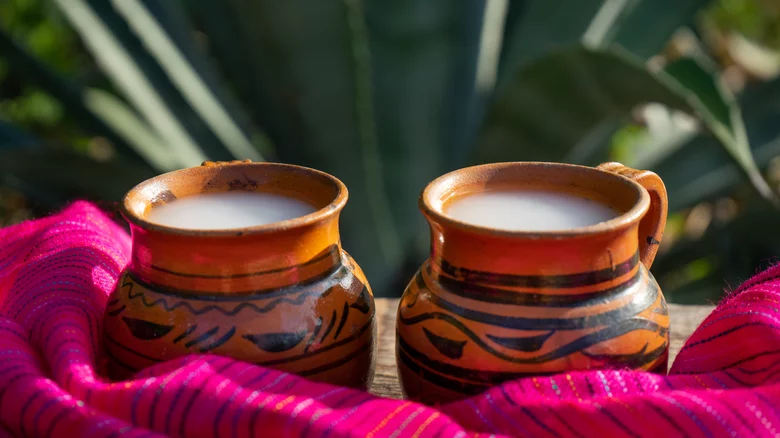Pulque and mezcal festival

The Pulque, Gastronomy, and Mezcal Festival offers an incredible journey through the Pre-Hispanic past in the heart of La Condesa.
The Pulque and Mezcal Festival will showcase over 70 types of curados (flavored pulque) and a wide variety of mezcal.
The lovers of the “elixir of the gods” have managed to rescue one of our country’s ancestral drinks, pulque, from political, social, and cultural exile. Such is its great success that today the Pulque, Typical Gastronomy, and Mezcal Festival of Mexico 2023 will arrive at one of the most exclusive points in Mexico City, La Condesa.
Now that pulque enjoys renewed popularity, all visitors can indulge in various curados and traditional Mexican cuisine. This is the third edition of the festival, created by the Adelitas Empresarias collective, who continue to promote pulque tradition, culture, and gastronomy in an event designed for friends and family.
What is pulque?
Pulque is a traditional Mexican alcoholic beverage with a long history that predates the arrival of the Spanish conquistadors. It is made from the fermented sap of the agave plant, primarily the Agave americana or Agave salmiana species. The process of making pulque involves extracting the sap, called “aguamiel” (honey water), from the heart of the mature agave plant.
The production of pulque begins by harvesting the agave plant, usually when it is around 8 to 12 years old. The leaves of the plant are cut off, revealing the central core or “piña,” which contains the sweet
. The aguamiel is collected into large containers or vats.
The aguamiel naturally ferments due to the presence of wild yeasts, and this fermentation process converts the sugars in the sap into alcohol. The resulting beverage, pulque, is mildly alcoholic, typically ranging from 4% to 6% alcohol by volume. It has a somewhat viscous texture and a unique taste, often described as slightly sweet and sour.
Pulque has been an important part of Mexican culture for centuries and was considered a sacred drink by the Aztecs and other indigenous civilizations. It played a significant role in religious ceremonies and rituals. Over time, its popularity has fluctuated, facing competition from other alcoholic beverages and undergoing periods of cultural decline. However, in recent years, there has been a resurgence of interest in traditional Mexican drinks, leading to a revival of pulque’s popularity and the establishment of pulquerías (pulque bars) in some areas of Mexico.
In modern times, pulque is sometimes mixed with various fruits, herbs, or spices to create flavored versions known as “curados.” Some of the popular curado flavors include strawberry, pineapple, and oat, among others.
What sorts of pulque and mezcal will be at the festival?
There will be over 200 options of pulque, mezcal, creams, cocktails, and curados from the states of Tlaxcala and Guerrero. As always, you can dance and taste various mezcal beverages. With the price of your ticket, you will receive an artisanal jícara (a traditional drinking vessel) to enjoy the different tastings in a traditional manner.
Mark this day on your agenda to try the succulent oat curado, which seems to be a favorite among everyone. Although, for the summer, the pulque de fibra (with all the ingredients of a green juice) is highly recommended, and of course, there will be more special flavors such as passion fruit, pineapple, sapote, and even “pulsaque.”
Varieties of mezcal
Regarding mezcal creams, you should know that they are great Mexican digestives, and one common way to enjoy them is after a traditional Mexican meal. Mezcal creams come in various flavors, but the most recognized ones are hazelnut, angel’s kiss, Oaxacan kiss, peanut, raspberry, soursop, and even marzipan and mocha, which are among the favorites.
Another novelty of this festival is that it will add a sporty touch to the celebration. For the second time, there will be different bike rides organized from various points in Mexico City, covering routes of 5, 15, and 30 kilometers, so you can pedal your way to the event and refresh yourself with some pulque.
If you don’t have a bicycle, they will collaborate with Baika Rool and Chaa México to provide bikes for the ride. All bike rides will be mixed, and the basic 5 km and 15 km rides are free, but the 30 km ride requires a registration fee.
Registration
The registration fee includes a medal upon completing your 30 kilometers, entrance to the festival, participation in the raffle, route coordinator, sweeper, paramedics, and hydration upon arrival. Registrations are already open, but some spots will also be available on the day of the event.
When you arrive after the bike ride, you can expect to find 70 different flavors of pulque, mezcal, and mezcal creams, along with the essential products from Mexican entrepreneurs, such as textiles, bags, jewelry, crafts, and more.
Where: Domestico; Nuevo León 80, Hipódromo Condesa, Cuauhtémoc.
When: Saturday, September 2, and Sunday, September 3, from 12:00 to 20:00.
How much: $40 in advance, $50 on the day of the event.
